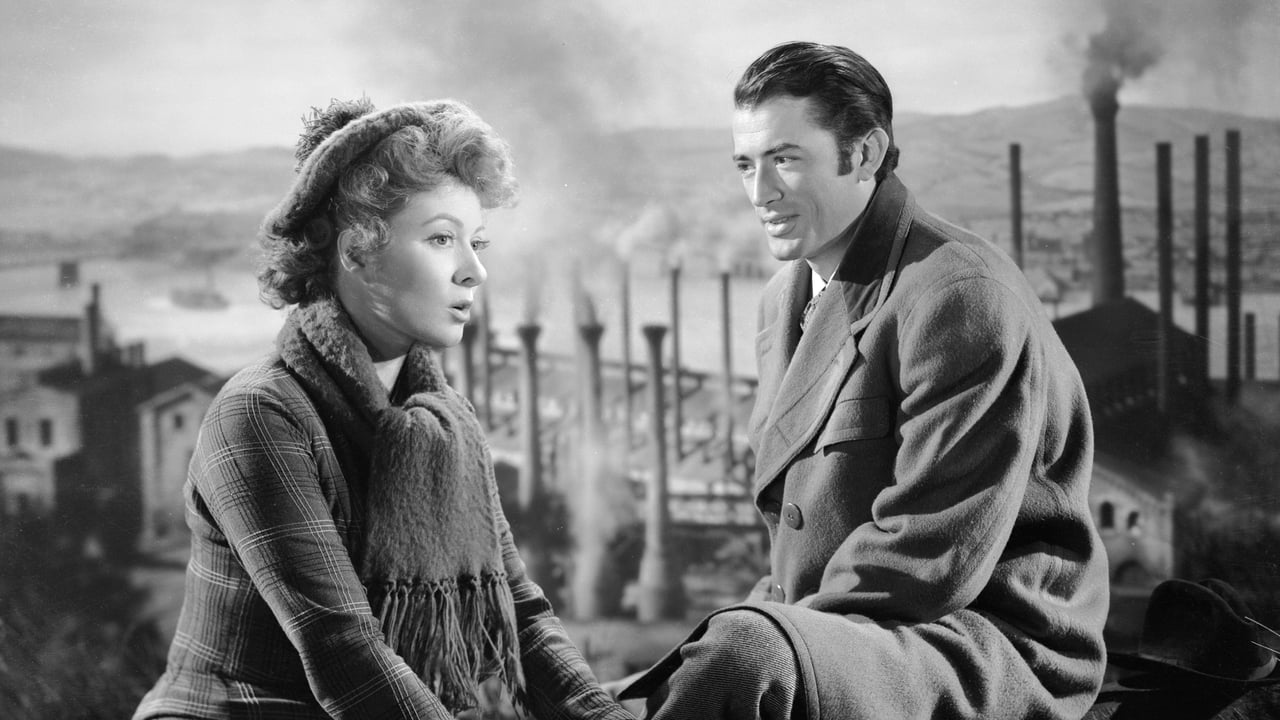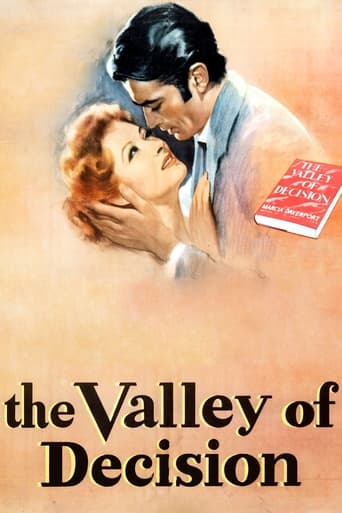Brightlyme
i know i wasted 90 mins of my life.
Aedonerre
I gave this film a 9 out of 10, because it was exactly what I expected it to be.
KnotStronger
This is a must-see and one of the best documentaries - and films - of this year.
Mischa Redfern
I didn’t really have many expectations going into the movie (good or bad), but I actually really enjoyed it. I really liked the characters and the banter between them.
vincentlynch-moonoi
This was only Gregory Peck's third movie, but it one of my very favorites that he starred in. And, I like it for 2 reasons. First, the star pairing of Peck with Greer Garson, and second, a sort of battle between 2 wonderful character actors -- Lionel Barrymore and Donald Crisp.You do need to understand that this is not only a drama, but also a very serious story. More serious than most dramas. Set in the steel-era of Pittsburgh, Peck's family owns one of the major steel plants, while Garson's family is simply Irish workers in the mills...except that her father (Lionel Barrymore) is an embittered old man who was crippled in a mill accident many years before. Garson goes to work in the mansion of Peck's family, including his father (Donald Crisp) and mother (Gladys Cooper), and 2 brothers and 1 sister (Marsha Hunt, Dan Duryea, and Marshall Thompson). Garson and Peck almost immediately fall in love, but Garson feels the love in inappropriate due to their different stations in life. So, she moves to Europe with Peck's sister. However, when father Crisp learns they were in loves, he calls her back, just in time for the showdown between the union and Crisp...when both patriarchs are killed. Film over. Not! A few years later, after Peck marries another woman, Peck's mother leaves her share of the mill to Garson, then dies, and it is Garson's vote which saves the mill for Peck. Peck leaves his meddlesome wife and Peck and Garson ride off into the sunset...well, at least off in a carriage.Is there romance? Yes, but it is overshadowed by the social issues related to mining and class distinctions between miners and owners. It's all quite interesting...but serious.Garson was nominated for an Academy Award for this picture, and she is superb as the Irish worker bee. Peck is excellent, as well. Donald Crisp turns in a superb performance and outshines Lionel Barrymore, who plays the villain here. The other siblings previously mentioned do their jobs. Jessica Tandy (whom Peck marries here) is also good at being cold. Gladys Cooper is excellent as the mother of Peck, here, but she was always such a fine character actress.It's not easy to fault this film, but...the musical score sometimes sounds more like a Western. And, I felt that Reginald Owens' role as a servant was over the top. But, other than that, the movie is excellent and well worth watching. And, one for the DVD shelf.
security09
This is the first time I watched this movie and I was totally absorbed in it. I loved Greer Garson in Mrs. Miniver, and again, in The Valley of Decision she gives another outstanding performance. Gregory Peck turns in his usual excellent performance as Paul Scott, the son of a wealthy steel mill owner (Donald Crisp), who falls in love with Mary (Greer Garson), the hired housekeeper. This romantic story may seem predictable at times, and yet, this held my undivided attention throughout. I found both of them believable as they struggled with their feelings for each other amidst family feuds and class bigotry. Mary unselfishly puts aside her own desires for Paul's sake and turns down his proposal of marriage. As the years go by, Paul marries Louise (Jessica Tandy)an embittered woman who cared nothing for the family or for Paul's devotion to the mill. On the other hand, Mary was a sympathetic and caring woman who was loved by almost everyone. Without revealing too much, I was delighted to see that love and good sense triumphed in the end. It is no surprise that Garson was nominated for her performance and all of the players were well cast for their respective roles. This is a memorable, heartfelt movie and I highly recommend it.
edwagreen
Greer Garson, with a terrific Irish brogue, earned still another Oscar nomination. With the exception of 1940, Miss Garson was nominated for best actress from 1939-1945, a Hollywood record.The film depicts the old problem of wealth vs. poverty. A pretty and pert Greer goes to work for the family of Gregory Peck. They are lovely, unpretentious people. Her dad, played by the irascible Lionel Barrymore, is a hot head if ever there were. His hot-headedness will ultimately lead to his downfall as the film goes on.We see wealth and snobbery associated with it, especially by Peck's wife, brilliantly played by a young Jessica Tandy. In a change of pace, veteran movie mother, Gladys Cooper, comes off as a wonderfully, kind sort of matriarch married to the indomitable Donald Crisp.The ending is great. All I can say is that fairness triumphs over snobbery. Class distinctions just seem to go away.
tjonasgreen
In Pittsburgh in 1873, plucky Irish immigrant Greer Garson accepts a position as a servant in the mansion of steel magnate Donald Crisp, though her father was crippled in his mill. Inevitably, Greer and Gregory Peck (as the principled second son of the family) find themselves drawn to each other despite class differences, and surprisingly, his parents spprove. But a series of dramatic events -- a steelworkers' strike, three violent killings, a spite marriage, a natural death and a surprising bequest -- all conspire to keep Greer and Greg apart while the audience is left to wonder when and how they can get together.In a way we don't care since these mismatched stars have no chemistry together. In only his third screen role, Gregory Peck is always competent and is sometimes better than that, but his cool, placid demeanor works against this tale of romance thwarted for over a decade. For her part, Greer Garson was never one to suggest sexual attraction or romantic passion, and she has the further handicap of looking much older than Peck and seeming too old to play her character in the early parts of the film. But by the end, when her character's age has caught up to her, Garson's usual poise and authority seem just right.If the lack of fireworks between the stars seems like a drawback, it somehow isn't because the narrative is really about the love affair an unhappy woman has with a warm, charismatic family. And here, the producer and the director Tay Garnett make sure the film is enlivened with a talented and varied supporting cast including Donald Crisp, Gladys Cooper, Lionel Barrymore (a hambone as usual), Dan Duryea, Preston Foster, Reginald Owen, Marshall Thompson and young Dean Stockwell. Of particular interest are two excellent supporting performances. MGM stalwart Marsha Hunt brings some bite and complexity to the role of Peck's sister, a selfish, superficial woman who is nevertheless decent and loving. And though Jessica Tandy spends most of the film in a thankless role as a brittle society girl hoping to snag Peck, by the end of the film she is allowed to give a vivid performance of bravura shrewishness, the kind of thing Agnes Moorehead usually did so well.

